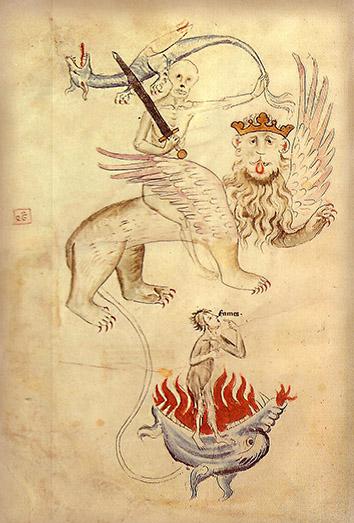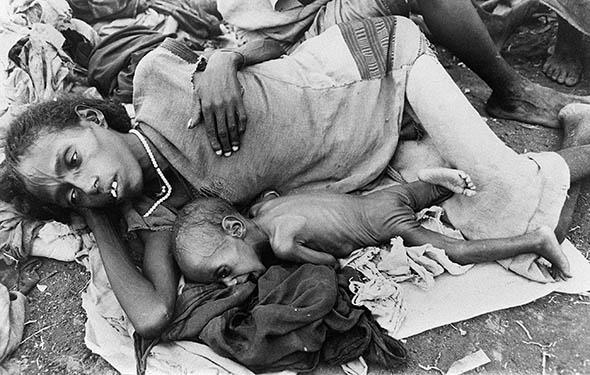The history of humanity is a history of hunger. Pretty much every society in recorded time has been wracked by famines, and a few have been destroyed by them. Sometimes these famines are spurred or exacerbated by political or military campaigns. Sometimes they’re due to human error. But the rather alarming fact is that the vast majority of famines throughout history have been caused by environmental factors we had (or believed we had) no control over. An increasingly pressing question for the 21st century is whether the illusion of powerlessness will begin a new cycle of starvation.
It’s difficult to imagine the modern world overtaken by famine, given that humans as a whole have never been better fed than we are today. Recent famines have primarily arisen as a byproduct of regional strife or mismanaged totalitarianism in distant parts of the globe. The African famines of the past two decades, though commonly attributed to drought, were actually triggered or significantly amplified by political tumult and foolish governmental policies. Even where weather plays a role, human agency always plays a bigger one.
Our popular understanding of history suggests that this has always been the case. The most infamous famines are those with an antagonist behind them. The Great Chinese Famine was a direct result of Mao Zedong’s calamitous Great Leap Forward, and the Ukrainian Holodomor was precipitated by Josef Stalin’s rapid industrialization and, some say, a genocidal attempt to eradicate Ukrainian nationalism. Most other famines in the public consciousness can be similarly traced back to a government that’s bumbling, malicious, or both. The Irish Potato Famine might have started with a fungal blight, but it was elevated to a crisis by the British government—then Ireland’s colonial overlords—which bungled its response while refusing to grant the Irish control over their own land.
Yet as terrible as these famines were, they don’t seem menacing today. Without a dictator or mismanaged empire in the picture, our food supply seems unlikely to be wrecked by criminal ignorance or idiocy.

Courtesy of Stiftung Weimarer Klassik, Herzogin Anna Amalia Bibliothek/Wikimedia Commons
This is an illusion. History is replete with famines that interrupted periods of apparent stability and thrust millions into starvation—and most of these disasters had no Stalin-style madman at the helm. For every notorious, human-caused famine on the books, there are thousands more caused by natural mayhem that have been relegated to footnotes. Who remembers the French famine of 1693–94, which took 1.5 million lives, or the European famine of 1315–17, which killed millions and laid waste to an entire continent? How about the estimated 1,830 famines that occurred in China between 108 B.C. and 1911, or the string of famines in 19th-century India that took 17 million lives?
These periods of hunger weren’t created by a power-crazed dictator, nor were they seriously worsened by human cruelty or corruption. Instead, they occurred for startlingly banal reasons: A rainy season lasted a little too long and killed off a year’s worth of food; a river that was supposed to flood never did; a microbe was introduced and killed off an entire crop. The market quivers, then collapses; the people starve. For millennia, these boom-and-bust cycles of starvation defined human life. That’s why famines feature so heavily in so many world religions: In the prescientific age, God’s wrath was a more obvious explanation for hunger than was microbial infestation.
We like to believe that we’ve learned to prevent these kinds of pedestrian famines, too, and to a certain extent, we have. Ever since ancient Egyptians learned to irrigate the Nile (to avoid famine), humans have developed ingenious workarounds to natural hazards. The sophisticated nexus of agriculture and food dispersal in developed countries seems unprecedentedly stable. Even those developing countries that aren’t wracked with political turmoil are basically well fed, still profiting from the afterglow of the Green Revolution or, in a pinch, foreign aid. Modern humans have essentially called Thomas Robert Malthus’ bluff, successfully exploding our population far beyond what anybody previously believed to be sustainable.
Malthus, however, may yet have the last laugh. We learned to avoid famines by outsmarting them, by uncovering and addressing the mechanisms behind widespread hunger. But today, a single factor—climate change—threatens to unbalance the Earth’s food supply. If we continue to grow and pollute at our current rate, our golden age of abundance may soon curdle into a new era of widespread famine.
This isn’t an abstract threat. A recent report from the U.N. Intergovernmental Panel on Climate Change found that rising temperatures are already cutting into global food supply. Although rising temperatures may expand the area where some crops can be grown, the net effect will be a negative impact on overall yields. In fact, climate change has already reduced corn and wheat production, and it is poised to slice into rice and soybean output as well. The ultimate impact of global warming, if it continues at current levels, could be a 2 percent cut in crop harvests each decade—a catastrophe given our rapidly climbing population rates.
And these are conservative estimates. On the more panic-inducing side of the spectrum, one NASA-funded study suggests civilization is currently careening toward “irreversible collapse” due to climate change. Humans, the study suggests, are currently exploiting resources more quickly than we’re developing them, dooming all but the wealthiest to a future of scarcity. Depressingly, we can’t just plan on developing technology to take care of all of our needs tomorrow: “Technological change,” the study notes, “tends to raise both per capita resource consumption and the scale of resource extraction” simultaneously—meaning, essentially, that we gobble up as many resources as technology permits, until we max out our resources altogether.
At some point, this arms race against ourselves is bound to boil over, and this breaking point may well take the form of famine. “In the context of likely if not inevitable global warming,” says Cormac Ó Gráda, an economist and renowned scholar of famines, “all bets on the future of famine in the longer run are off.” Agricultural output is liable to break down as fewer and fewer crops can be grown in fewer and fewer regions; this could spark a chain reaction, starting in developing countries but quickly reaching into the developed world and clobbering our global food supply.
Because most Westerners today haven’t encountered hunger on the level that our ancestors routinely did, it’s hard to envision this future of famine on more than a cerebral level. We haven’t suffered the slow-motion brutality of death from starvation, the excruciating pain as the body’s organs fail and muscle mass wastes away, the piteous descent into suicide and cannibalism. And it remains possible that, with ingenuity and fast action, we never will.
But as humans march toward irreversible climate change, this window for forestalling the impending crisis is quickly closing. The best way to ward off hunger in the medium term is to redistribute resources more evenly, a seemingly impossible task in a world with an ever-widening wealth disparity. The long-term goal is even harder: To stave off truly terrible climate change, and the famines that may come with it, we’ll need to dramatically reduce our dependence on fossil fuels even as our global population skyrockets. If we can’t do that, then we’ll soon learn that we don’t need a Stalin or a Mao to drive large portions of the world into the horrors of famine.
